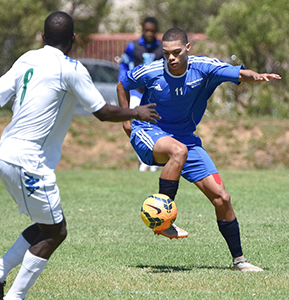
Kovsies and Tshwane University of Technology in action at the University Sport South Africa Football Club Championships.
Photo: Charl Devenish
|
All 30 teams fought fiercely for their positions at the University Sport South Africa (USSA) Football Club Championships 2015 Tournament, held at the University of the Free State. The tournament was meant to be hosted here in Bloemfontein last year, but was re-scheduled for 21-25 March 2016. The University of Pretoria became champions in the men’s section, while the women’s trophy found a home at the University of the Western Cape.
Of the15 institutions taking part in the men’s section, Kovsies emerged at number 11. Our women’s team took the number seven spot among the 14 contenders.
KovsieSoccer coach, Godfrey Tenoff, was impressed with the women’s team. “Our girls outperformed themselves, given that we had only 15 players when we started the tournament, and ended up with 10 who were intact. They were absolutely phenomenal. We never lost in the group matches. The strength of the group enabled us to qualify for the Varsity Football competition.”
On the other hand, the performance of the men’s team was less impressive. “It’s disappointing that we did not produce the kind of performance needed for big competitions, although we had the best team. We are number one in the SAB League, yet some players are lacking the big match temperament,” he said.
However, there is still hope for better scores. The forthcoming Vodacom Cup and the USSA Championships taking place later this year are an opportunity to improve.